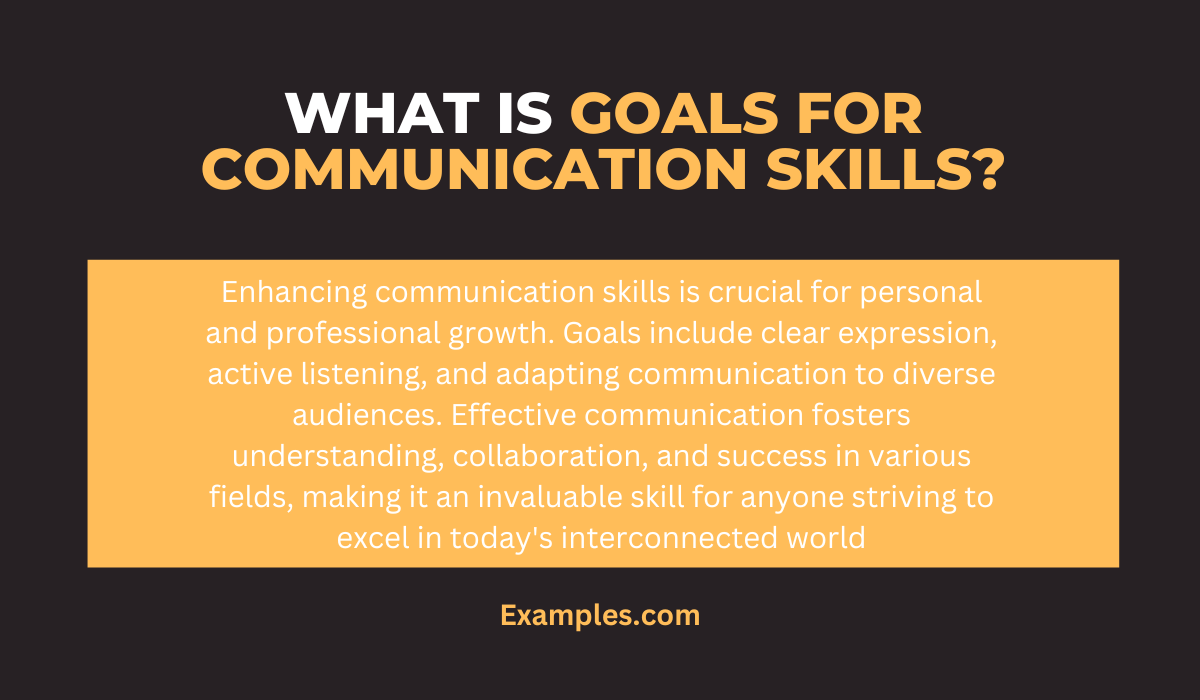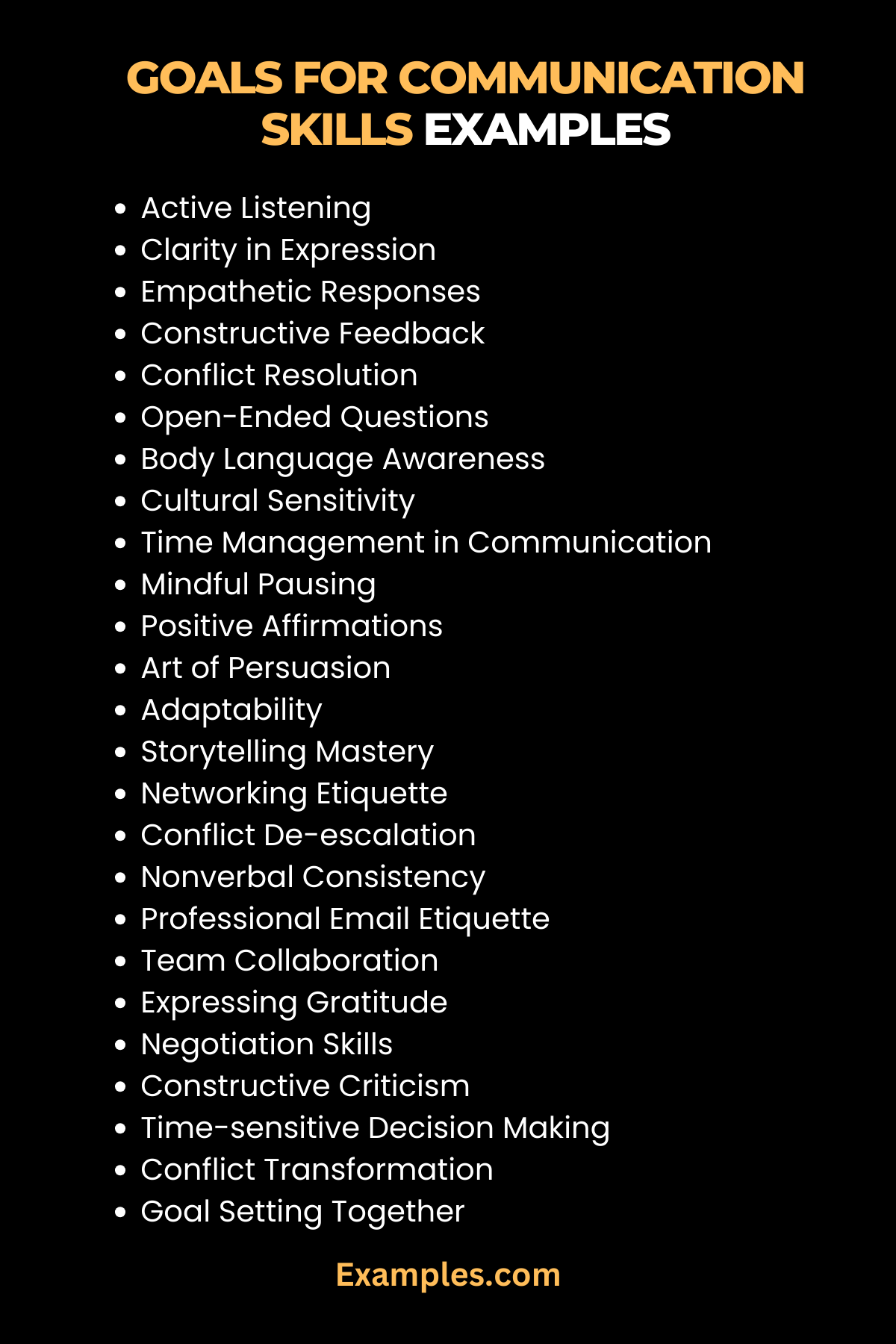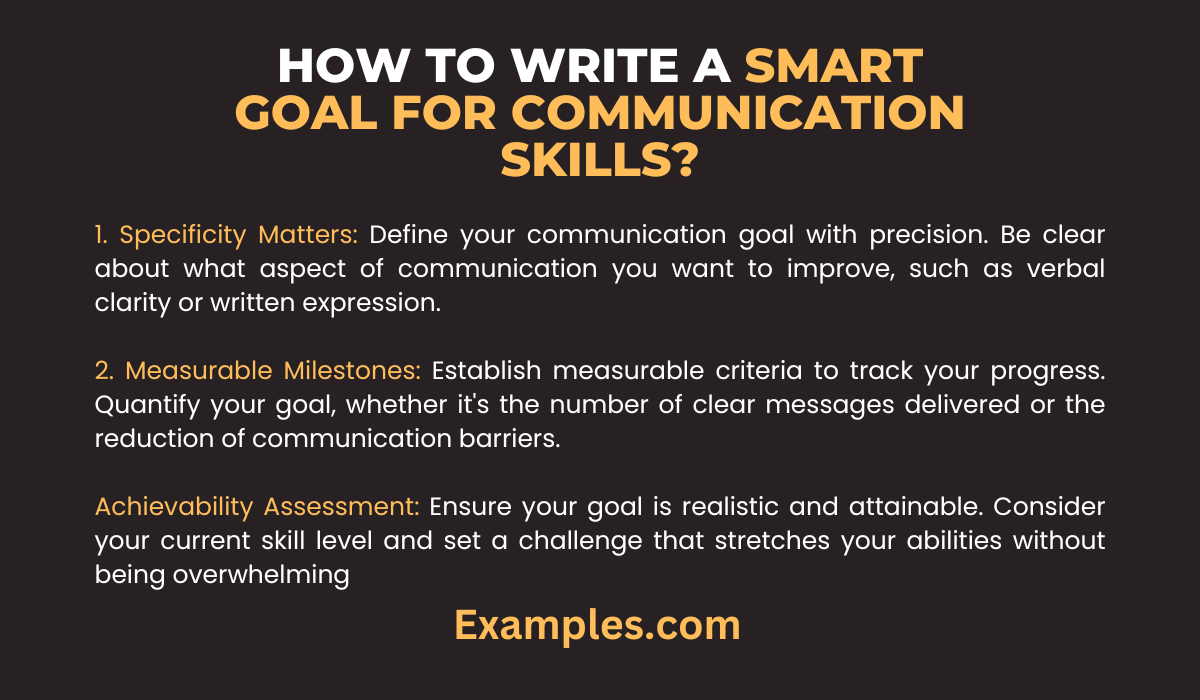Goals for Communication Skills
Unlock the secrets of effective communication with our comprehensive guide on Goals for Communication Skills. From interpersonal dynamics to professional settings, we delve into diverse examples to illuminate the path. Elevate your communication prowess with insights on nonverbal cues, assertiveness, and more. Discover the art of impactful expression and enhance your skills with practical Communication Examples. Dive into this complete guide for a transformative journey toward mastering communication in various contexts.
What is Goals for Communication Skills?

What is the best Example of Goals for Communication Skills?
An exemplary goal for communication skills is to master assertive communication. This involves expressing thoughts, needs, and feelings in a direct yet respectful manner. The goal is to strike a balance between passivity and aggression, fostering healthy interactions. By practicing assertiveness, individuals build confidence, establish boundaries, and cultivate positive relationships. This goal exemplifies the essence of effective communication, empowering individuals to express themselves authentically while fostering mutual understanding. Dive deeper into this key example to enhance your communication journey.
30 Goals for Communication Skills Examples
Explore the diverse landscape of communication mastery with our curated list of 30 Goals for Communication Skills Examples. This guide provides a comprehensive overview, blending insights with keyword-rich content to enhance your communicative abilities.

- Active Listening: Engage fully by maintaining eye contact and nodding.
- Clarity in Expression: Clearly articulate thoughts for better understanding.
- Empathetic Responses: Show understanding and compassion in interactions.
- Constructive Feedback: Provide helpful insights without being critical.
- Conflict Resolution: Navigate disagreements with diplomacy and resolution.
- Open-Ended Questions: Foster meaningful conversations by avoiding yes/no queries.
- Body Language Awareness: Convey messages effectively through gestures and posture.
- Cultural Sensitivity: Respect diverse perspectives to bridge cultural communication gaps.
- Time Management in Communication: Be concise and considerate of others’ time.
- Mindful Pausing: Allow moments of silence for reflection during conversations.
- Positive Affirmations: Encourage and uplift others with affirming statements.
- Art of Persuasion: Influence opinions by presenting compelling arguments.
- Adaptability: Adjust communication style based on the audience and context.
- Storytelling Mastery: Convey information through engaging narratives for impact.
- Networking Etiquette: Build professional relationships through effective networking.
- Conflict De-escalation: Calm tense situations through strategic communication.
- Nonverbal Consistency: Ensure alignment between verbal and nonverbal cues.
- Professional Email Etiquette: Craft clear and concise emails for business communication.
- Team Collaboration: Foster a collaborative environment through effective team communication.
- Expressing Gratitude: Acknowledge and appreciate others genuinely.
- Negotiation Skills: Reach mutually beneficial agreements through effective negotiation.
- Time-sensitive Decision Making: Communicate efficiently during time-critical situations.
- Constructive Criticism: Provide feedback that encourages growth and improvement.
- Conflict Transformation: Turn conflicts into opportunities for positive change.
- Goal Setting Together: Collaboratively establish and pursue shared communication objectives.
- Networking Follow-Up: Strengthen connections by following up with contacts after interactions.
- Clear Instruction Delivery: Ensure understanding by providing instructions in a concise and straightforward manner.
- Feedback Solicitation: Actively seek feedback to continuously improve communication effectiveness.
- Facilitation of Group Discussions: Guide discussions to encourage participation and diverse viewpoints.
- Adaptive Leadership Communication: Tailor communication to inspire and guide team members effectively.
Goals for Communication Skills Examples in Resume
Enhance your professional profile with strategic communication by incorporating these Goals for Communication Skills Examples in your resume. This guide empowers you to showcase your exceptional communication abilities, setting you apart in the competitive job market. Craft a compelling narrative that highlights your unique skills and leaves a lasting impression on potential employers.
- Tailored Messaging: Customize your resume content for specific job applications.
- Quantifiable Achievements: Showcase accomplishments with measurable impact.
- Keyword Optimization: Strategically include industry-relevant keywords for resume scanning systems.
- Clarity in Job Descriptions: Clearly articulate your roles and responsibilities in each position.
- Effective Use of Action Verbs: Begin bullet points with powerful action verbs to convey impact.
- Storytelling Approach: Narrate your career journey through engaging storytelling.
- Professional Tone: Maintain a professional and formal tone throughout your resume.
- Alignment with Job Requirements: Tailor your resume to align with the specific requirements of each job.
- Visual Appeal: Use clean formatting and design elements for visual appeal.
- Highlighting Soft Skills: Emphasize essential soft skills such as teamwork, adaptability, and communication.
In the realm of communication, mastering effective skills is pivotal. This guide delves into the main goals, offering a detailed exploration to enhance your communication prowess.
1. Clarity and Precision:
Achieve clarity in conveying thoughts and ideas, minimizing misunderstandings for seamless communication.
2. Active Listening Mastery:
Cultivate the ability to attentively listen, comprehend, and respond thoughtfully, fostering deeper connections.
3. Building Rapport:
Establish genuine connections by understanding the importance of rapport in various communication contexts.
4. Conflict Resolution:
Develop strategies to address conflicts constructively, turning challenges into opportunities for growth.
5. Adaptability:
Navigate diverse communication scenarios with flexibility, adjusting your approach for optimal engagement.
6. Empathy in Communication:
Infuse empathy into interactions, enhancing relationships by understanding and validating others’ perspectives.
7. Effective Feedback:
Master the art of providing constructive feedback, fostering a culture of continuous improvement.
8. Setting Clear Objectives:
Outline and communicate specific goals to align individuals and teams toward shared achievements.
9. Influence and Persuasion:
Hone the ability to persuasively convey ideas, gaining support and buy-in from others.
10. Professional Presence:
Cultivate a professional demeanor, considering verbal and nonverbal cues to convey competence and confidence.
How to Write a Smart Goal for Communication Skills?
Crafting a Smart Goal for communication skills involves a strategic and systematic approach. Follow this comprehensive guide to develop objectives that are Specific, Measurable, Achievable, Relevant, and Time-bound, ensuring effective and measurable progress in your communication prowess.

- Specificity Matters: Define your communication goal with precision. Be clear about what aspect of communication you want to improve, such as verbal clarity or written expression.
- Measurable Milestones: Establish measurable criteria to track your progress. Quantify your goal, whether it’s the number of clear messages delivered or the reduction of communication barriers.
- Achievability Assessment: Ensure your goal is realistic and attainable. Consider your current skill level and set a challenge that stretches your abilities without being overwhelming.
- Relevance to Your Journey: Align your communication goal with your overall objectives. Whether it’s personal development or career advancement, ensure your goal contributes to your broader aspirations.
- Time-Bound Commitment: Set a clear timeframe for achieving your communication goal. This adds urgency and helps you stay focused on consistent improvement.
- Example Smart Goal for Communication Skills:
- Specific: Enhance assertive communication skills in team meetings.
- Measurable: Clearly express thoughts in at least three team discussions per week.
- Achievable: Practice assertiveness in low-stakes situations first.
- Relevant: Improving team communication contributes to overall project success.
- Time-Bound: Achieve noticeable improvement within the next four weeks.
In conclusion, mastering communication skills is pivotal for personal and professional success. This guide has equipped you with insights on setting specific and achievable goals, crafting Smart Goals, and practical tips for effective communication. Implementing these strategies will undoubtedly enhance your ability to express, connect, and thrive in various contexts. Elevate your communication game and embark on a journey of continuous improvement.



